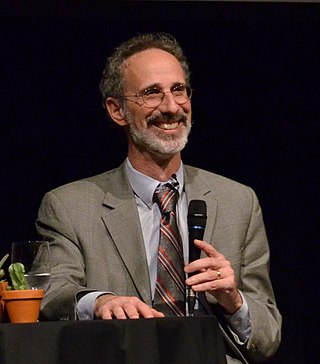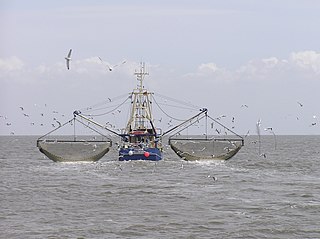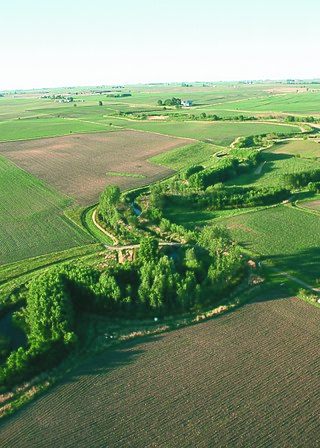
Fishery can mean either the enterprise of raising or harvesting fish and other aquatic life or, more commonly, the site where such enterprise takes place. Commercial fisheries include wild fisheries and fish farms, both in freshwater waterbodies and the oceans. About 500 million people worldwide are economically dependent on fisheries. 171 million tonnes of fish were produced in 2016, but overfishing is an increasing problem, causing declines in some populations.

Peter H. Gleick is an American scientist working on issues related to the environment. He works at the Pacific Institute in Oakland, California, which he co-founded in 1987. In 2003 he was awarded a MacArthur Fellowship for his work on water resources. Among the issues he has addressed are conflicts over water resources, water and climate change, development, and human health.
Environmental security examines threats posed by environmental events and trends to individuals, communities or nations. It may focus on the impact of human conflict and international relations on the environment, or on how environmental problems cross state borders.
Backcasting is a planning method that starts with defining a desirable future and then works backwards to identify policies and programs that will connect that specified future to the present. The fundamentals of the method were outlined by John B. Robinson from the University of Waterloo in 1990. The fundamental question of backcasting asks: "if we want to attain a certain goal, what actions must be taken to get there?"
Environmental terrorism consists of one or more unlawful or even hostile actions that harm or destroy environmental resources or deprive others of their use. It is different to environmental vandalism, which is a rather permitted but ethically disputed destruction of environment.

The German Advisory Council on Global Change is an independent, scientific advisory body to the German Federal Government, established in 1992 in the run-up to the Rio Earth Summit (UNCED).

Presented annually since 1991, the Stockholm Water Prize is an award that recognizes outstanding achievements in water related activities. Over the past three decades, Stockholm Water Prize Laureates have come from across the world and represented a wide range of professions, disciplines and activities in the field of water.
The Global Water Partnership (GWP) is an international network created to foster an integrated approach to water resources management (IWRM) and provide practical advice for sustainably managing water resources. It operates as a network, open to all organisations, including government institutions, agencies of the United Nations, bi- and multi-lateral development banks, professional associations, research institutions, non-governmental organisations, and the private sector.
Peak water is a concept that underlines the growing constraints on the availability, quality, and use of freshwater resources. Peak water was defined in 2010 by Peter Gleick and Meena Palaniappan. They distinguish between peak renewable, peak non-renewable, and peak ecological water to demonstrate the fact that although there is a vast amount of water on the planet, sustainably managed water is becoming scarce.

A wild fishery is a natural body of water with a sizeable free-ranging fish or other aquatic animal population that can be harvested for its commercial value. Wild fisheries can be marine (saltwater) or lacustrine/riverine (freshwater), and rely heavily on the carrying capacity of the local aquatic ecosystem.

The aim of water security is to make the most of water's benefits for humans and ecosystems. The second aim is to limit the risks of destructive impacts of water to an acceptable level. These risks include for example too much water (flood), too little water or poor quality (polluted) water. People who live with a high level of water security always have access to "an acceptable quantity and quality of water for health, livelihoods and production". For example, access to water, sanitation and hygiene services is one part of water security. Some organizations use the term water security more narrowly for water supply aspects only.
Environmental governance (EG) consists of a system of laws, norms, rules, policies and practices that dictate how the board members of an environment related regulatory body should manage and oversee the affairs of any environment related regulatory body which is responsible for ensuring sustainability (sustainable development) and manage all human activities—political, social and economic. Environmental governance includes government, business and civil society, and emphasizes whole system management. To capture this diverse range of elements, environmental governance often employs alternative systems of governance, for example watershed-based management. Obviously, in fact the EG arrangements are very diversed and not at all as inclusive as we could wish them to be.

A flexible barge is a non-rigid barge usually made of fabric.
The International WaterCentre (IWC) is a Brisbane-based organisation providing education, training, and applied research to develop capacity and promote whole-of-water cycle approaches to Integrated Water Management globally.

Water resource policy, sometimes called water resource management or water management, encompasses the policy-making processes and legislation that affect the collection, preparation, use, disposal, and protection of water resources. The long-term viability of water supply systems poses a significant challenge as a result of water resource depletion, climate change, and population expansion.

The International Institute for Sustainable Development (IISD) is an independent think tank founded in 1990 working to shape and inform international policy on sustainable development governance. The institute has three offices in Canada - Winnipeg, Ottawa, and Toronto, and one office in Geneva, Switzerland. It has over 150 staff and associates working in over 30 countries.
Caroline King-Okumu is an international development opportunities manager for the UK Centre for Ecology and Hydrology. She was formerly a senior researcher for the International Institute for Environment and Development (IIED). Her major areas of research are dryland ecosystems, economic and environmental assessment, and climate change. She is considered an international expert on land and water management, particularly drylands agriculture. King-Okumu is based in Kenya but is involved in research and projects throughout the world.

Nature-based solutions is the sustainable management and use of natural processes to tackle socio-environmental issues. These issues include for example climate change mitigation and adaptation, water security, and disaster risk reduction. The aim is that resilient ecosystems provide solutions for the benefit of both societies and biodiversity. The 2019 UN Climate Action Summit highlighted nature-based solutions as an effective method to combat climate change. For example, nature-based systems for climate change adaptation can include natural flood management, restoring natural coastal defences, and providing local cooling.

Susanna Wood is a New Zealand scientist whose research focuses on understanding, protecting and restoring New Zealand's freshwater environments. One of her particular areas of expertise is the ecology, toxin production, and impacts of toxic freshwater cyanobacteria in lakes and rivers. Wood is active in advocating for the incorporation of DNA-based tools such as metabarcoding, genomics and metagenomics for characterising and understanding aquatic ecosystems and investigating the climate and anthropogenic drivers of water quality change in New Zealand lakes. She has consulted for government departments and regional authorities and co-leads a nationwide programme Lakes380 that aims to obtain an overview of the health of New Zealand's lakes using paleoenvironmental reconstructions. Wood is a senior scientist at the Cawthron Institute. She has represented New Zealand internationally in cycling.
The WorldRiskReport is an annual technical report on global disaster risks. The yearly issues of the WorldRiskReport focus on varying critical topics related to disaster risk management and are published in German and English. The report includes the WorldRiskIndex, which identifies the risk of an extreme natural event becoming a disaster for 181 countries worldwide.











